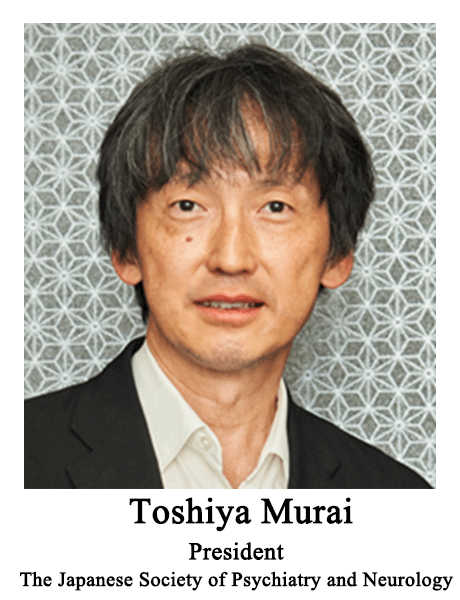

I am deeply honored to have been appointed President of the Japanese Society of Psychiatry and Neurology. Leading an organization of over 20,000 members is both a great privilege and a profound responsibility. Upon assuming this role, I have set forth the following five goals as guiding principles for my presidency.
1. Enhancing the Quality of Psychiatric Care
Our Society is committed to creating a better and more inclusive society for individuals with mental illness, their families and supporters, and the general public, through the advancement of high-quality psychiatric care. We will continue to issue timely statements on various emerging issues, and conduct research and investigations as needed. Committee activities serve as the backbone of our Society’s initiatives. I will encourage the active involvement of younger members, who will lead the next generation of psychiatric care. Together, we will address the many challenges facing psychiatry today with steady resolve, and with bold action when required.
2. Advancing Psychiatric Research
Our Society publishes several distinguished journals—Psychiatry and Clinical Neurosciences (PCN), PCN Reports, and the Journal of the Japanese Society of Psychiatry and Neurology—each with its own unique focus, contributing to the dissemination of high-quality research. Participation in our Annual Scientific Meetings continues to grow, with increasingly enriched and diverse programs. I intend to actively support innovative initiatives in both academic publishing and scientific gatherings. At the same time, we will promote the appropriate and ethically guided use of rapidly evolving treatment modalities such as neuromodulation technologies, telepsychiatry, and digital therapeutics, which are becoming increasingly integrated into clinical practice.
3. Ensuring Adequate Numbers of Board-certified Psychiatrists and Supervising Physicians, and Strengthening the Educational Framework
A shortage or uneven distribution of board-certified psychiatrists and supervising physicians can jeopardize the stability of regional healthcare systems. As one of the core medical specialty societies, we are committed to responding swiftly to changes in the social landscape, particularly the frequent revisions in healthcare policy and regulations. Ensuring a sufficient number of qualified specialists and supervisors is essential, and it is equally important to maintain the quality of their training. This requires continuous professional development by supervisors themselves, which means a strong commitment to lifelong learning. Currently, medical education is evolving into an integrated system that spans undergraduate and postgraduate stages. I aim to establish a platform that facilitates and encourages continuous learning from medical school through to post-specialist training.
4. International Collaboration and a Psychiatry Open to the Future
I am committed to further elevating the scientific standards of psychiatry and enhancing its global visibility and competitiveness. At the same time, we will expand international exchange in psychiatric care and education more actively than ever before. Through cooperation with colleagues around the world, and constructive competition when appropriate, we will strive together to achieve better psychiatric care on a global scale.
5. Ensuring Transparency
As we pursue the four priorities outlined above, transparency will be essential. We will communicate the Society’s activities to the general public more proactively than ever, while also working to make the operations of the Board of Directors and various committees more visible and accessible to our members. I hope these efforts will encourage broader participation in the Society’s activities by an even greater number of members.
I have thus outlined my vision across five key areas. However, with over 20,000 members, our Society is large and diverse. While we may share a common goal of advancing psychiatry and the Society itself, it is only natural that we differ in our views on which challenges to prioritize. Such diversity of opinion is not only inevitable but a sign of a healthy organization. I believe it is the responsibility of the Board of Directors—and my own as President—to listen carefully to these diverse perspectives, give them clear voice, and, when differences arise, do our utmost to find optimal solutions. My vision is for a vibrant and dynamic Society, where the diverse passions of our members generate synergy and drive collective progress.
Toshiya Murai
The Japanese Society of Psychiatry and Neurology